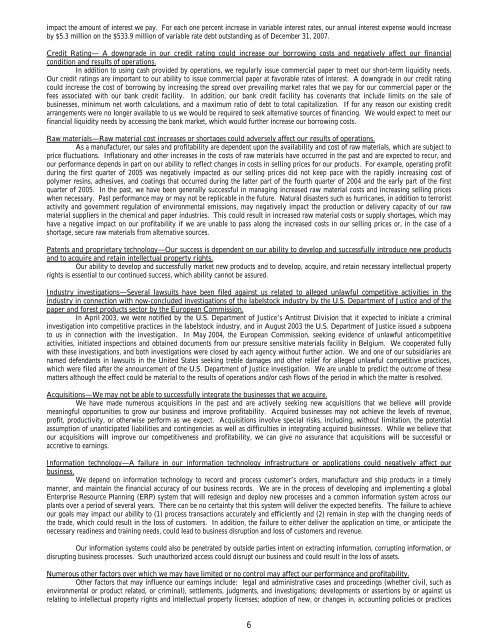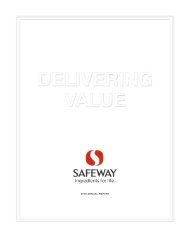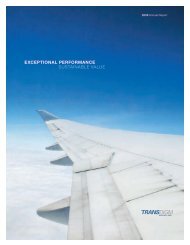Bemis Company 2007 Annual Report - IR Solutions
Bemis Company 2007 Annual Report - IR Solutions
Bemis Company 2007 Annual Report - IR Solutions
You also want an ePaper? Increase the reach of your titles
YUMPU automatically turns print PDFs into web optimized ePapers that Google loves.
impact the amount of interest we pay. For each one percent increase in variable interest rates, our annual interest expense would increase<br />
by $5.3 million on the $533.9 million of variable rate debt outstanding as of December 31, <strong>2007</strong>.<br />
Credit Rating— A downgrade in our credit rating could increase our borrowing costs and negatively affect our financial<br />
condition and results of operations.<br />
In addition to using cash provided by operations, we regularly issue commercial paper to meet our short-term liquidity needs.<br />
Our credit ratings are important to our ability to issue commercial paper at favorable rates of interest. A downgrade in our credit rating<br />
could increase the cost of borrowing by increasing the spread over prevailing market rates that we pay for our commercial paper or the<br />
fees associated with our bank credit facility. In addition, our bank credit facility has covenants that include limits on the sale of<br />
businesses, minimum net worth calculations, and a maximum ratio of debt to total capitalization. If for any reason our existing credit<br />
arrangements were no longer available to us we would be required to seek alternative sources of financing. We would expect to meet our<br />
financial liquidity needs by accessing the bank market, which would further increase our borrowing costs.<br />
Raw materials—Raw material cost increases or shortages could adversely affect our results of operations.<br />
As a manufacturer, our sales and profitability are dependent upon the availability and cost of raw materials, which are subject to<br />
price fluctuations. Inflationary and other increases in the costs of raw materials have occurred in the past and are expected to recur, and<br />
our performance depends in part on our ability to reflect changes in costs in selling prices for our products. For example, operating profit<br />
during the first quarter of 2005 was negatively impacted as our selling prices did not keep pace with the rapidly increasing cost of<br />
polymer resins, adhesives, and coatings that occurred during the latter part of the fourth quarter of 2004 and the early part of the first<br />
quarter of 2005. In the past, we have been generally successful in managing increased raw material costs and increasing selling prices<br />
when necessary. Past performance may or may not be replicable in the future. Natural disasters such as hurricanes, in addition to terrorist<br />
activity and government regulation of environmental emissions, may negatively impact the production or delivery capacity of our raw<br />
material suppliers in the chemical and paper industries. This could result in increased raw material costs or supply shortages, which may<br />
have a negative impact on our profitability if we are unable to pass along the increased costs in our selling prices or, in the case of a<br />
shortage, secure raw materials from alternative sources.<br />
Patents and proprietary technology—Our success is dependent on our ability to develop and successfully introduce new products<br />
and to acquire and retain intellectual property rights.<br />
Our ability to develop and successfully market new products and to develop, acquire, and retain necessary intellectual property<br />
rights is essential to our continued success, which ability cannot be assured.<br />
Industry investigations—Several lawsuits have been filed against us related to alleged unlawful competitive activities in the<br />
industry in connection with now-concluded investigations of the labelstock industry by the U.S. Department of Justice and of the<br />
paper and forest products sector by the European Commission.<br />
In April 2003, we were notified by the U.S. Department of Justice’s Antitrust Division that it expected to initiate a criminal<br />
investigation into competitive practices in the labelstock industry, and in August 2003 the U.S. Department of Justice issued a subpoena<br />
to us in connection with the investigation. In May 2004, the European Commission, seeking evidence of unlawful anticompetitive<br />
activities, initiated inspections and obtained documents from our pressure sensitive materials facility in Belgium. We cooperated fully<br />
with these investigations, and both investigations were closed by each agency without further action. We and one of our subsidiaries are<br />
named defendants in lawsuits in the United States seeking treble damages and other relief for alleged unlawful competitive practices,<br />
which were filed after the announcement of the U.S. Department of Justice investigation. We are unable to predict the outcome of these<br />
matters although the effect could be material to the results of operations and/or cash flows of the period in which the matter is resolved.<br />
Acquisitions—We may not be able to successfully integrate the businesses that we acquire.<br />
We have made numerous acquisitions in the past and are actively seeking new acquisitions that we believe will provide<br />
meaningful opportunities to grow our business and improve profitability. Acquired businesses may not achieve the levels of revenue,<br />
profit, productivity, or otherwise perform as we expect. Acquisitions involve special risks, including, without limitation, the potential<br />
assumption of unanticipated liabilities and contingencies as well as difficulties in integrating acquired businesses. While we believe that<br />
our acquisitions will improve our competitiveness and profitability, we can give no assurance that acquisitions will be successful or<br />
accretive to earnings.<br />
Information technology—A failure in our information technology infrastructure or applications could negatively affect our<br />
business.<br />
We depend on information technology to record and process customer’s orders, manufacture and ship products in a timely<br />
manner, and maintain the financial accuracy of our business records. We are in the process of developing and implementing a global<br />
Enterprise Resource Planning (ERP) system that will redesign and deploy new processes and a common information system across our<br />
plants over a period of several years. There can be no certainty that this system will deliver the expected benefits. The failure to achieve<br />
our goals may impact our ability to (1) process transactions accurately and efficiently and (2) remain in step with the changing needs of<br />
the trade, which could result in the loss of customers. In addition, the failure to either deliver the application on time, or anticipate the<br />
necessary readiness and training needs, could lead to business disruption and loss of customers and revenue.<br />
Our information systems could also be penetrated by outside parties intent on extracting information, corrupting information, or<br />
disrupting business processes. Such unauthorized access could disrupt our business and could result in the loss of assets.<br />
Numerous other factors over which we may have limited or no control may affect our performance and profitability.<br />
Other factors that may influence our earnings include: legal and administrative cases and proceedings (whether civil, such as<br />
environmental or product related, or criminal), settlements, judgments, and investigations; developments or assertions by or against us<br />
relating to intellectual property rights and intellectual property licenses; adoption of new, or changes in, accounting policies or practices<br />
6







